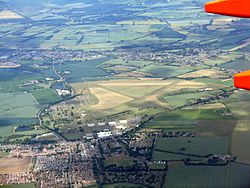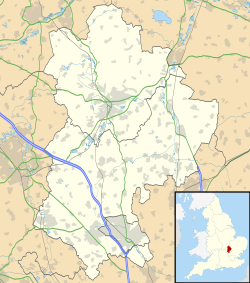RAF Henlow facts for kids
Quick facts for kids RAF Henlow
|
|||||||||||||
|---|---|---|---|---|---|---|---|---|---|---|---|---|---|
| Henlow, Bedfordshire in England | |||||||||||||

RAF Henlow from above
|
|||||||||||||

|
|||||||||||||
|
Shown within Bedfordshire
|
|||||||||||||
| Coordinates | 52°00′56″N 000°18′12″W / 52.01556°N 0.30333°W | ||||||||||||
| Type | RAF training station | ||||||||||||
| Site information | |||||||||||||
| Owner | Ministry of Defence | ||||||||||||
| Operator | Royal Air Force | ||||||||||||
| Controlled by | No. 2 Group | ||||||||||||
| Site history | |||||||||||||
| Built | 1918 | ||||||||||||
| Built by | McAlpine (1918) various since |
||||||||||||
| In use | 1918–Present | ||||||||||||
| Garrison information | |||||||||||||
| Current commander |
Wing Commander Chris Brooke | ||||||||||||
| Occupants |
|
||||||||||||
| Airfield information | |||||||||||||
| Identifiers | ICAO: EGWE | ||||||||||||
| Elevation | 51.2 metres (168 ft) AMSL | ||||||||||||
|
|||||||||||||
Royal Air Force Henlow, or RAF Henlow, is a special base for the Royal Air Force (RAF) in Bedfordshire, England. It is located between the towns of Bedford, Luton, and Stevenage.
RAF Henlow is home to the RAF Centre of Aerospace Medicine. This center helps keep pilots and aircrew healthy and safe. It also houses the Joint Arms Control Implementation Group (JACIG). This group works on international agreements about weapons.
The base used to have a museum called the Signals Museum. This museum closed in June 2024. Flying activities at RAF Henlow stopped in July 2020. The Ministry of Defence plans to close the base completely. This closure is expected to happen from 2026 onwards.
Contents
History of RAF Henlow
Early Days and Parachute Testing
RAF Henlow was first chosen as a place to fix military aircraft in 1917. It was built by a company called MacAlpine in 1918. Four large hangars were built there. These hangars are now considered important historical buildings. A town called Henlow Camp grew up around the base.
The base officially opened on May 18, 1918. It was used to repair aircraft coming back from the First World War. In May 1920, RAF Henlow became the first place in the UK to test parachutes. Another parachute unit joined them later. They tested parachutes by having people hang from the wings of Vimy aircraft. The parachutes would then open, letting them float safely to the ground.
Famous People and World War II
In 1924, a school for engineering officers moved to Henlow. Between 1932 and 1933, Sir Frank Whittle was a student at the RAF technical college here. He later became famous for inventing the jet engine. He even worked on testing aero engines at the base for a while.
During the Second World War, RAF Henlow played a big role. It was used to put together Hawker Hurricane fighter planes. These planes were built in Canada and shipped to Henlow in large containers. Once they arrived, they were reassembled at the base.
In 1941, during an operation called Quickforce, 100 mechanics from Henlow helped. They went onto ships that were taking Hurricane fighters to Malta. They finished building the planes right on the ship decks. Then, the planes flew off to Malta to help in the war. Over 1,000 Hurricanes were sent to Henlow from Canada. The base also repaired many other types of aircraft during the war.
The Control Tower and Training
The empty wooden crates that the Hurricane planes came in were used for something special. They were used to build the first control tower at Henlow. This original tower and parts of the airfield were even shown in the 1969 war movie 'The Battle of Britain'.
After the Second World War, a major RAF technical training college started at Henlow in 1947. It trained future engineers and officers for the RAF. This college later joined with RAF College Cranwell in 1965. Another training unit for officers also moved here but later moved to Cranwell in 1980.
In December 2011, it was found that some parts of RAF Henlow had small amounts of radiation. This was from radium used to make aircraft dials glow in the dark during the Second World War. This was a common practice at the time.
RAF Henlow was once part of a larger combined base called RAF Brampton Wyton Henlow. However, RAF Brampton closed in 2013. Flying activities at RAF Henlow officially stopped in July 2020.
What's at RAF Henlow Now?
Royal Air Force Units
- No. 2 Group (Air Combat Support)
- Air Security Force
- Forensic Exploitation Flight: This team helps find clues from digital devices.
- Scientific Support Unit
- Air Security Force
- RAF Medical Services
- RAF Centre of Aerospace Medicine: This is the main medical center for air and space health.
- Centre of Aerospace Medicine Headquarters
- Aviation Medicine Wing: Focuses on health for flying.
- Occupational and Environmental Medicine Wing: Looks at health in the workplace and environment.
- Support Wing
- RAF Centre of Aerospace Medicine: This is the main medical center for air and space health.
Strategic Command Units
- Directorate of Overseas Bases
- Joint Arms Control Implementation Group (JACIG): This group works on agreements to control weapons.
Signals Museum
The Signals Museum was a special place at RAF Henlow. It showed how electronic communication developed in the RAF. It covered everything from the First World War onwards. The museum first opened in 1999. However, the Signals Museum closed permanently on June 8, 2024.
The Future of RAF Henlow
The Ministry of Defence (MOD) announced plans to close RAF Henlow on September 6, 2016. At first, they expected the base to close by 2020. By 2019, the plan was to close it between 2020 and 2023. However, in January 2024, the MOD said that the closure and sale of the base would now happen from 2026.
See also
- List of Royal Air Force stations
 | Delilah Pierce |
 | Gordon Parks |
 | Augusta Savage |
 | Charles Ethan Porter |


